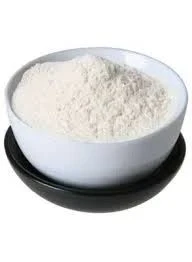
Dec . 05, 2024 22:59 Back to list
hpmc solubility in cold water
HPMC Solubility in Cold Water An In-Depth Analysis
Hydroxypropyl methylcellulose (HPMC) is a cellulose derivative widely utilized in various industrial applications, particularly in pharmaceuticals, food, and construction. One of its significant characteristics is its solubility in cold water. This property plays a pivotal role in numerous applications, influencing the formulation and effectiveness of products ranging from drug formulations to construction materials.
What is HPMC?
HPMC is a non-ionic polymer derived from cellulose, which is a natural polysaccharide obtained from plant cell walls. Through a series of chemical modifications involving the substitution of hydroxyl groups in the cellulose backbone with hydroxypropyl and methoxy groups, HPMC exhibits enhanced solubility profiles and thermal stability compared to regular cellulose. This modification makes HPMC a versatile agent, allowing it to dissolve in cold water and form viscous solutions, making it an ideal candidate for various applications.
Solubility Characteristics
HPMC's solubility in cold water is influenced by several factors, including its molecular weight and degree of substitution. Generally, HPMC is soluble in water at room temperature and cold conditions, typically achieving complete dissolution without the need for heating. This characteristic is particularly advantageous in pharmaceutical formulations, where the incorporation of HPMC can enhance the solubility of active ingredients, aiding their bioavailability.
The cold-water solubility of HPMC is attributed to its hydrophilic nature, stemming from the hydroxyl groups on the polymer chain that facilitate hydrogen bonding with water molecules. Moreover, the hydrophilic properties contribute to its ability to function as a thickener and stabilizer in various formulations. As a result, HPMC can effectively modify the viscosity of solutions, which is essential in applications such as coatings and adhesives, where control over consistency is paramount.
Applications in Pharmaceuticals
In the pharmaceutical industry, HPMC is widely used as a binder and controlled-release agent in tablet formulation. Its solubility in cold water makes it an excellent choice for formulating immediate-release or sustained-release dosage forms. When HPMC is incorporated into a tablet matrix, it can aid in the controlled release of the active pharmaceutical ingredient (API), prolonging its therapeutic effect.
hpmc solubility in cold water

Moreover, HPMC is frequently used in ophthalmic preparations due to its ability to form gel-like structures in the presence of water, which helps to keep medications in contact with the eye surface longer. This property enhances the bioavailability of eye drops and promotes patient adherence due to the increased comfort and effectiveness of the medication.
Applications in Food and Nutrition
HPMC also finds extensive application in the food industry, where it serves as a thickening agent, emulsifier, and stabilizer. Its cold-water solubility allows it to be efficiently incorporated into various products, including sauces, dressings, and baked goods. In gluten-free formulations, for instance, HPMC can improve the texture and moisture retention, mimicking the properties typically derived from gluten.
Furthermore, HPMC can serve as a dietary fiber, contributing to the nutritional profile of food products. Its soluble nature allows it to easily dissolve in food matrices, providing health benefits such as enhanced satiety and improved digestive health.
Construction Applications
Beyond the realms of pharmaceuticals and food, HPMC is also integral to the construction industry. It is employed as an additive in cement-based products, improving workability and water retention in mortars and plasters. The ability of HPMC to dissolve in cold water and form films enhances adhesion and durability in construction materials.
Conclusion
In summary, HPMC's solubility in cold water is a defining characteristic that underpins its multifunctional applications across various industries. Its versatility, stemming from its hydrophilic nature and ability to modify viscosity, makes it an invaluable ingredient in pharmaceutical formulations, food products, and construction materials. As industries continue to seek innovative solutions to meet consumer demands and enhance product performance, HPMC is poised to remain a crucial component in the development of modern formulations. Understanding the factors influencing HPMC's solubility will enable manufacturers to leverage its properties more effectively, ensuring optimal results in their respective applications.
-
Versatile Hpmc Uses in Different Industries
NewsJun.19,2025
-
Redispersible Powder's Role in Enhancing Durability of Construction Products
NewsJun.19,2025
-
Hydroxyethyl Cellulose Applications Driving Green Industrial Processes
NewsJun.19,2025
-
Exploring Different Redispersible Polymer Powder
NewsJun.19,2025
-
Choosing the Right Mortar Bonding Agent
NewsJun.19,2025
-
Applications and Significance of China Hpmc in Modern Industries
NewsJun.19,2025







